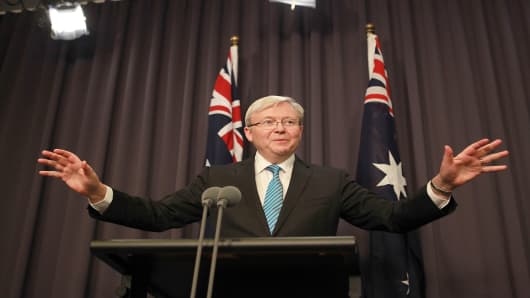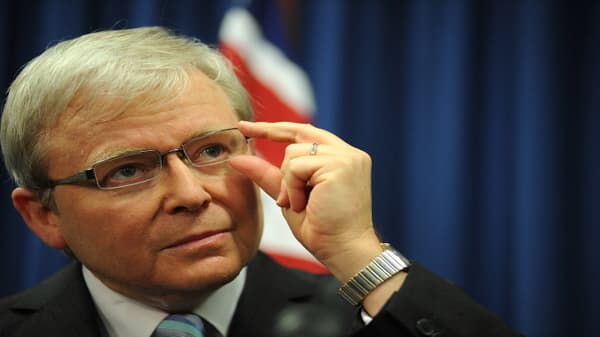The freshly-instated Prime Minister of Australia, Kevin Rudd, may be winning over voters ahead of the keenly-contested Federal elections, but his increased popularity is raising the prospect of political uncertainty which could be bad news for stocks, analysts say.
An influential Australian poll on Monday revealed that Rudd, who ousted his predecessor Julia Gillard in a dramatic leadership vote last Wednesday, has revitalized support for the ruling Labor government.
The survey by Newspoll in The Australian newspaper showed Rudd's return as prime minister had lifted the party's vote by six percentage points from 43 percent to 49 percent over the past week. Meanwhile, support for the conservative opposition party, led by Tony Abbott, slumped to 51 percent from 57 percent.
(Read More: Can Rudd Stop the Rout in the Aussie Dollar?)
Rudd's individual popularity as prime minister also surged. He overtook Abbott as the preferred prime minister, the poll also showed, with 49 percent support compared to Abbott's 35 percent.
But what's turning out to be a comeback story for the ruling party could become a stumbling block for markets.
Market watchers tell CNBC that if Rudd gains further support, one potential outcome would be a hung parliament – a two party system of government which occurs when neither major political party achieves a majority – a scenario which will lead to further uncertainty for Australian businesses and a dampener for stocks.
"The 'Rudd revival' has brought back the potential for a hung parliament which would be the worst case scenario for markets," said Evan Lucas, market strategist at trading firm IG's Melbourne office.
(Read More: What Bust? Australia Set for Huge Boom, Report Says)
"For the Labor party to gain a majority, they would need both to retain the seats they already have, and pick up new ones, which doesn't seem as likely, so a hung parliament would be more realistic. But the last thing the market needs is another three years of uncertainty, with a government which continually struggles to get its agenda pushed through," added Lucas.
Stocks have given a mixed response to the recent political shake up. The Australian Stock Exchange rose 1.47 percent on the day Rudd was instated as prime minister. However, the index was down near 2 percent on Monday as investors struggled to interpret the fresh political uncertainty.





